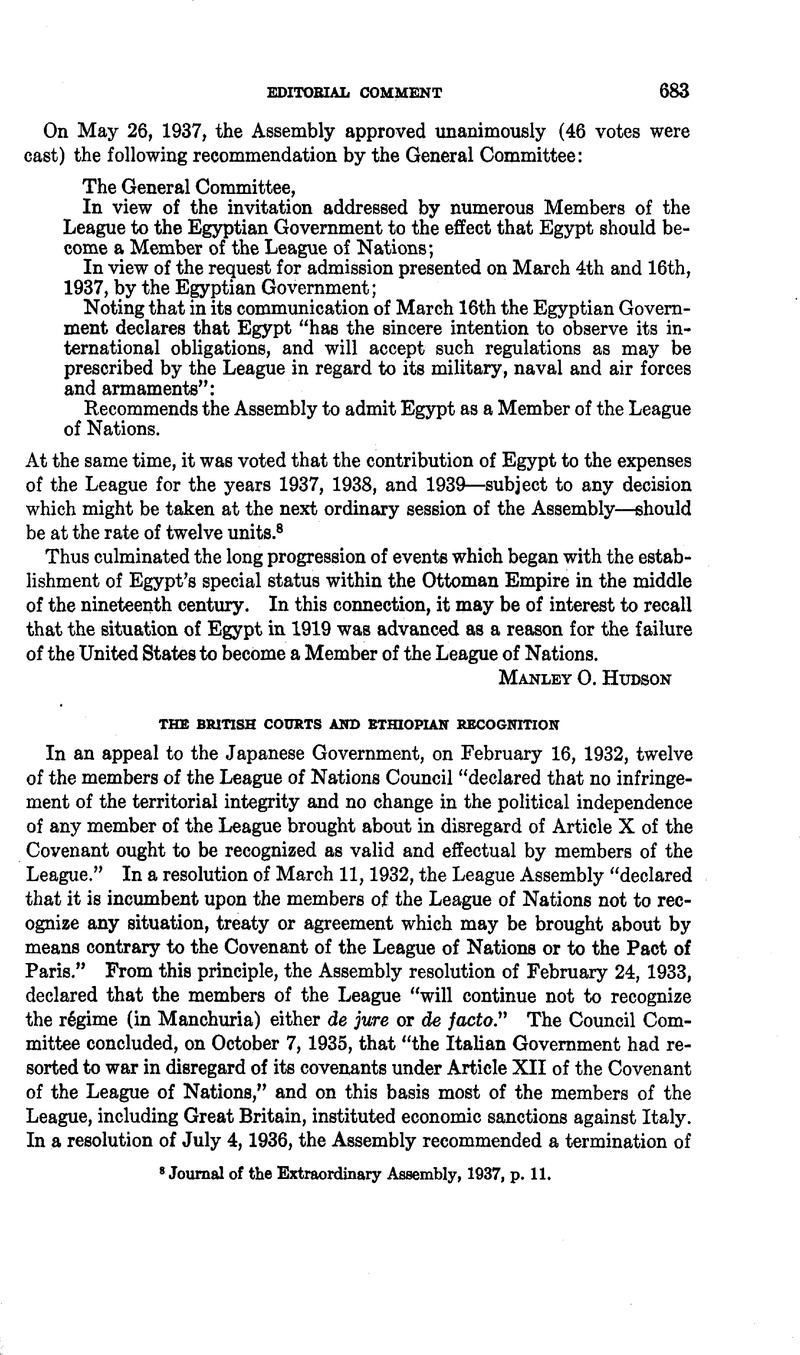Published online by Cambridge University Press: 08 September 2021

1 This resolution stated: “The American nations further declare that they will not recognize any territorial arrangement of this (Chaco) controversy which has not been obtained by peaceful means nor the validity of territorialcquisitions which may be obtained through occupation or conquest by force of arms.” (U. S. Department of State Press Releases, Aug. 6, 1932, pp. 100–101.) The writer has discussed the origin and significance of this doctrine in this JOURNAL, Vol. 26 (1932), p. 342 ff., and in Pacific Affairs, 1935, Vol. 8, p. 439 ff. For the legal consequences of non-recognition, see League of Nations, Advisory Committee Report, June 7, 1932, Official Journal, Sp. Supp., No. 113, p. 11; May 16, 1934, League of Nations Official Journal, 1934, p. 430, printed in Hudson,Cases and Other Materials on International Law, 2d ed., St. Paul, 1936, p. 109 ff.
2 53 Times L. R. 751.
3 Art. 45 provides: “The military occupant shall take all steps in his power to re-establish and insure, as far as possible, public order and safety, while respecting, unless absolutely prevented, the law in force in the country.” Taxes beyond the normal, contributions, requisitions, property seizures, can only be for military purposes. (Arts. 49, 51, 52, 53.)
4 See especially Thorington v. Smith (1868), 8 Wall. 1, 8–10; Texas v. White (1868), 7 Wall. 700, 733; Horn v. Lookhart (1873), 17 Wall. 570, 580; Sprott v. U. S. (1874), 20 Wall. 459,464, quoted with others in Moore, Digest of International Law, Vol. 1, p. 41 ff. James and Co. v. Second Kussian Insurance Co. (1925), 239 N. Y. 248; Slosberg v. N. Y. Life Ins. Co. (1927), 244 N. Y. 482; Salimoff and Co. v. Standard Oil Co. of N. Y. (1933), 262 N. Y. 220. These cases are reported in Hudson, op. cit., p. 124 ff., and, with numerous others of the type, are discussed by Dickinson, this JOURNAL, Vol. 25 (1931), p. 223 ff. See also infra, note 12.
5 L. E., [1921] 3 K. B. 552.
6 On this point the court also cited White, Child and Beney, Ltd. v. Eagle Star and British Dominions Insurance Co., Ltd., 38 Times L. R. 616.
7 See W. Harrison Moore, Act of State in British Law; Q. Wright, Control of American Foreign Relations, 1922, pp. 165–175.
8 This dealt with the Soviet Government of Russia and no question of an international obligation not to recognize was involved.
9 “If the meaning of the act is doubtful, it is a reason for not putting a particular interpretation upon it, that the interpretation would violate the comity of nations.”(Leroux v. Brown, L. J. 220, p. 3.) “An act of congress ought never to be construed to violate the law of nations if any other possible construction remains.” (Marshall, C. J., in Murray v. Schooner Charming Betsey (1804), 2 Cranch 64,118.) See also Talbot v. Seaman, 1 Cranch 1; Little v. Barreme (1804), 2 Cranch 170; Q. Wright, Control of American Foreign Relations, 1922. pp. 165–175, and this JOURNAL, Vol. 11 (1917), p. 10.
10 See Salimoff and Co. v. Standard Oil Co. of N. Y. (1933), 262 N. Y. 220. This point of view is not applicable where the question at issue is the competence of a de facto government to sue or to be sued in a foreign court, but only where its competence to act arises collaterally in connection with the determination of private rights. See Dickinson, this JOURNAL, Vol. 25 (1931), pp. 219–220.
11 Supra, note 4.
12 Doubtless there are definite rules of international law limiting the authority of a military occupant during the course of war. Acts of such a de facto authority, which ignore these limitations, even though functioning locally, should be regarded as ultra vires and void by a foreign court. See City of Antwerp v. Germany, German-Belgian Mixed Arbitral Tribunal, Annual Digest of Public International Law Cases, 1925–26, Case No. 361; In re Falch, French Court of Cassation, ibid., 1927–28, Case No. 383; Oppenheim, International Law, 5th ed. (Lauterpacht), Vol. 2, pp. 316 ff., 343 ff. There seems to be nothing inherently unreasonable in the view urged by the plaintiff in the instant case (p. 752) that the Italian de facto government in Ethiopia was merely a military occupant, and the court admitted that, if that were its status, its authority would be limited, (p. 754.) The court rejected this view because it had “no relevance in principle to the case of a de facto government set up in an area from which the former Government has departed, and in which there is no Governmental authority except that of the de facto Government.” But it would seem that these conditions would necessarily exist in all cases of military occupation. Even the fact that active hostilities were at an end would not necessarily be determining. Where territory has been provisionally occupied in time of peace by a government not its sovereign under a treaty or armistice, the rules of military occupation have usually been held applicable. See cases cited by Oppenheim, op. cit., p. 346. The court was doubtless influenced by the practical consideration that “confusion” would ensue “if the only bank of issue in the country were allowed to continue its business under the control of persons who, until the last moment, seem to have been engaged in strenuous attempts to assist the displaced Government to resist the attacks of those who have become the de facto Government.” (p. 754.) It might have added that the view urged by the plaintiff would have had the effect, alluded to by American courts in cases dealing with corporations liquidated in Russia by the unrecognized Soviet Government, of “endowing with extraterritorial vitality, corporations which though dead in the country which created them, exist like fugitive ghosts outside its boundaries.” (Salimoff and Co. v. Standard Oil Co. of N. Y. (1933), 262 N. Y. 220.)